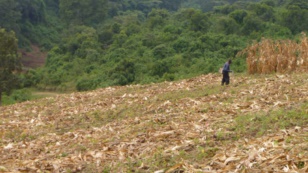VOA慢速英语:土地利用的改变可能会增加灾祸的发生
Efforts to increase food production in Africa may be increasing the risk of plague infection. Plague has beenkilling people for hundreds of years. A new report looks at efforts to clear land for farming in natural,undeveloped areas of Tanzania. The report links the development of natural lands into croplands to a sharp increase in the number of rats. It warns the animals often carry insects infected with plague.
Many people become frightened when they hear the word “plague.” One of the most famous periods ofplague death was known as the “Black Death.” It was a time 700 years ago when the disease killed more than 25 million people in Europe.
Health officials do not believe plague will kill many people in Africa. But theyare worried about the rising number of plague infections. Thirty to 60 percentof those infected will die if they are not given medicine.
Plague is caused by bacterium. It is passed between animals and humansthrough the bite of an inflected flea or by touching an infected animal. Ratsoften carry fleas. The insects feed on the blood of an infected rat.
There are three forms of plague. The most common is bubonic plague. This was the disease that spread in Europe during the 14th century. Bubonic plague causes enlargement of lymph nodes. The lymphatic system is the part of the body’s natural defense system against disease.
If the plague infection is not treated, the bacteria can reach the lungs. Then, the person may develop pneumonic plague. This is the least common butmost aggressive form of the disease. It can be easily spread through smalldroplets expelled from the person’s nose or mouth. A person infected withbubonic plague cannot infect others.
 |
|
Conversion of forests to agricultural use create habitats for small rats that carry disease such as plague. (Photo by Douglas McCauley) |
The World Health Organization says pneumonic plague is one of the mostdeadly infectious diseases. People suffer high body temperature, shaking,pain, weakness, and muscle and joint pain within two to three days of beinginfected.
Antibiotic drugs can cure the disease. But the infected individual must takethem very quickly, because pneumonic plague can kill people within 24 hoursafter infection. The WHO says only a small number of reported cases are of the pneumonic form.
Kristofer Helgen is with the Smithsonian Institution’s Museum of Natural History in Washington, D.C. He helped to write the new report. It waspublished online in the American Journal of Tropical Medicine and Hygiene. He spoke to VOA about the disease.
“It maybe surprises people to learn that plague remains a public healthconcern in various parts of the world -- especially in Africa south of theSahara. Plague circulates in small mammals and rodents. And when theconditions are right, it’s a disease that can spread to people and it can still be a deadly disease. Now, plague is a disease that is treatable with antibiotics. And in that regard, it’s considerably maybe less scary, less alarming thanother emerging diseases like Ebola. But we should remember that this is adisease that is still on the ground in Africa and remains a public healthconcern.”
Mr. Helgen says the amount of farmland in northern Tanzania has risensharply in recent years. By his estimate, the croplands have expanded by 70 percent. He and other researchers also attempted to estimate the number of rats in areas where maize was planted. They found the rat population doubled in those areas, compared to neighboring land that had not been developed for agriculture.
Mr. Helgen says that as the amount of farmland increases, so does thenumber of rats. He notes that the animals and people often live in the sameareas, which makes it easier for plague to spread.
“And this is an animal that we often will call a commensal rodent species. Andliterally that word commensal means ‘eating from the same table’ -- in other words, the notion that this is a rat that does go into peoples’ houses and villages and interacts with people in their living spaces.”
He notes that rats have a major effect on peoples’ lives. The animals eatpeople’s food, spread disease and make it more difficult for farmers tosucceed.
The plague never completely disappears. It may stay in the wild for 10 or 20years. Then, something happens and the number of rats increases. Thedisease then begins to spread in agricultural areas, then to towns and cities.Many people in an area may die, but the disease rarely spreads outside acountry. Only people within a limited area are infected. When the number ofcases begins to decline, scientists will say “the outbreak has been contained.”
The World Health Organization says people should not be afraid of the plague. It says scientists have developed modern and effective ways to prevent, treatand cure the ancient disease.
I’m Christopher Jones-Cruise.
Joe De Capua reported on the plague with additional reporting from LisaSchlein, Nancy Steinbach and Cynthia Kirk. Christopher Jones-Cruise wrotethis story for VOA Learning English. George Grow was the editor.
_______________________________________________________________
Words in This Story
infect – v. to cause (someone or something) to become sick or affected bydisease
bacterium – n. any one of a group of very small living things that often causedisease (usually plural)
bubonic (plague) – n. a very serious disease that killed many people in theMiddle Ages
circulate – v. to go or spread from one person, place or thing to another
on the ground – idiomatic expression events where things are actuallyhappening; not at a distance. Describes a situation viewed up-close or thepeople in a position to view a situation up-close, in detail; typically used bysomeone not close to the situation being discussed
notion – n. an idea or opinion
interact – v. to come together and have an effect on each other; often usedwith the word “with”
Has plague affected your country? Is some of your natural land being turnedinto cropland? We want to hear from you. Write your thoughts in the comments section.
- 频道推荐
- |
- 全站推荐
- 推荐下载
- 网站推荐




















